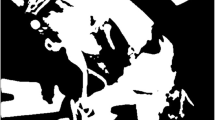Abstract
The visual systems of humans and primates outperform the best artificial vision systems by almost any measure. Humans can easily recognize as complex objects as faces even if they haven’t seen them in such conditions before. However, experiments with the inverted faces (Thatcher illusion) show strong dependences between parts and their configuration. We propose pattern recognition rules similar to the primate visual brain on the basis of the simple shape classification in the intermediate area of the visual cortex (V4). In the present work we have described interactions between parts and their configurations using single cell responses as the brain expertise (decision attribute). Experimental data as the set of condition (stimulus) and decision (cell responses) attributes were placed into a decision table. Applying the rough set theory (Pawlak, 1992) we have divided our stimuli into equivalent classes determined by evoked cell responses. On the basis of the decision table, we found the decision rules. Comparing decision rules for responses to object and to its parts, we have found the interaction rules in the receptive fields of the area V4. We have proposed the interaction rules for objects that are simpler than faces but we expect that such rules can give us neurophysiological basis for the Gestalt perception of the complex objects. By comparing responses of different cells we have found equivalent concept classes. However, many different cells show inconsistency between their decision rules, which may suggest that the brain uses several different decision logics in order to make object perception insensitive to changes in properties of its parts (rough parts).
Preview
Unable to display preview. Download preview PDF.
Similar content being viewed by others
References
Pawlak, Z.: Rough Sets- Theoretical Aspects of Reasoning about Data. Kluwer Academic Publishers, Boston, London, Dordrecht (1991)
Pollen, D.A., Przybyszewski, A.W., Rubin, M.A., Foote, W.: Spatial receptive field organization of macaque V4 neurons. Cereb Cortex 12, 601–616 (2002)
Przybyszewski, A.W.: Checking brain expertise using rough set theory. Rough Sets and Intelligent System Paradigms, 746–755 (2007)
David, S.V., Hayden, B.Y., Gallant, J.L.: Spectral receptive field properties explain shape selectivity in area V4. J. Neurophysiol. 96, 3492–3505 (2006)
Zadah, L.A.: Toward a perception-based theory of probabilistic reasoning with imprecise probabilities. Journal of Statistical Planning and Inference 105, 233–264 (2002)
Przybyszewski, A.W., Linsay, P.S., Gaudiano, P., Wilson, C.: Basic Difference Between Brain and Computer: Integration of Asynchronous Processes Implemented as Hardware Model of the Retina. IEEE Trans. Neural Networks 18, 70–85 (2007)
Treisman, A.: Features and objects: the fourteenth Bartlett memorial lecture. Q. J. Exp. Psychol. A 40, 201–237 (1988)
Przybyszewski, A.W., Gaska, J.P., Foote, W., Pollen, D.A.: Striate cortex increases contrast gain of macaque LGN neurons. Vis. Neurosci. 17, 485–494 (2000)
Author information
Authors and Affiliations
Editor information
Rights and permissions
Copyright information
© 2008 Springer-Verlag Berlin Heidelberg
About this paper
Cite this paper
Przybyszewski, A.W. (2008). Interactions between Rough Parts in Object Perception. In: An, A., Matwin, S., Raś, Z.W., Ślęzak, D. (eds) Foundations of Intelligent Systems. ISMIS 2008. Lecture Notes in Computer Science(), vol 4994. Springer, Berlin, Heidelberg. https://doi.org/10.1007/978-3-540-68123-6_26
Download citation
DOI: https://doi.org/10.1007/978-3-540-68123-6_26
Publisher Name: Springer, Berlin, Heidelberg
Print ISBN: 978-3-540-68122-9
Online ISBN: 978-3-540-68123-6
eBook Packages: Computer ScienceComputer Science (R0)




